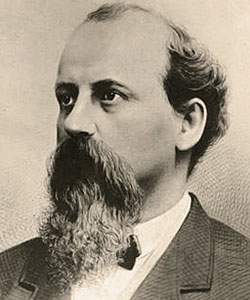Gustavus Vasa Fox, Fort Sumter (American National Bibliography)
Scholarship
Although [Gustavus] Fox was a Democrat with little interest in the slavery issue, he was outraged by secession. He was a patriotic nationalist who believed it was the manifest destiny of the United States to expand, not to disintegrate. After South Carolina fired on the Star of the West and prevented the reinforcement of Fort Sumter in Charleston's harbor, Fox, as a civilian, planned an expedition for that fort's relief. Through his wife's brother-in-law, Montgomery Blair, the new postmaster general, Fox met Lincoln, who adopted his plan. As the expedition approached Charleston, the Confederacy attacked Sumter, but stormy weather and absent vessels prevented Fox from provisioning Sumter before it surrendered. He was chagrined, but Lincoln assured him that above all others he would select him for a similar "daring and dangerous enterprize" (Roy P. Basler, ed., The Collected Works of Abraham Lincoln, vol. 4 [1953-1955], p. 351).
Ari Hoogenboom, "Fox, Gustavus Vasa," American National Biography Online, February 2000, http://www.anb.org/articles/05/05-00250.html.
Gustavus Vasa Fox, Assistant Secretary of the Navy (American National Bibliography)
Scholarship
On 8 May 1861 [President Abraham] Lincoln urged that [Gustavus] Fox, "a live man, whose services we cannot well dispense with" (Roy P. Basler, ed., The Collected Works of Abraham Lincoln, vol. 4 [1953-1955], p. 363), be given the crucial task of assisting Secretary of the Navy Gideon Welles. Initially as chief clerk and then as assistant secretary, Fox was the de facto chief of naval operations during the Civil War, eclipsing during his tenure the entrenched power and autonomy of the Navy Department bureaus. To blockade the Confederacy, the Union navy had to buy and arm or build sturdy, fast, shallow-draft vessels, and to supply and repair them, it had to capture (with army support) bases near southern ports. With his naval, merchant marine, and political connections, Fox was tailored for this work. He had the confidence of line officers, shipping magnates, and politicians, especially Lincoln and Senator James W. Grimes of the Committee on Naval Affairs. Personable and a lover of food and cigars, Fox was a boon dinner companion who could explain political imperatives to commanders and the navy's needs and limitations to politicians. Brimming with self-confidence, energy, and enthusiasm, he despised "old fogyism" and embraced innovative weapons and ships. He was decisive, but his seemingly impulsive faith in and enthusiasm for men and machines, strategies and tactics came only after reading pertinent articles, consulting specialists, conducting tests, and evaluating accomplishments.
Ari Hoogenboom, "Fox, Gustavus Vasa," American National Biography Online, February 2000, http://www.anb.org/articles/05/05-00250.html.
Gustavus Vasa Fox (Hoogenboom, 2008)
Scholarship
Though he never fought in a battle, no one had a greater impact on the Union navy than Gustavus Vasa Fox, and no one made a greater contribution to the navy’s success. He was integrally involved in acquiring its ships, determining their armament, choosing their commanders, organizing them into squadrons, and developing the strategy they followed. The tactics he advocated were daring, as was the monitor program he embraced. Admirals and generals have a tendency to fight the current war with the weapons and ships developed in the previous war, until they prove obsolete. That the Union navy did not fall into this trap was largely due to Fox’s eagerness to adopt the new. The Civil War is renowned as the first railroad war. It also was the first steamboat war, and no one appreciated that fact more than Fox. Steamboats, many of them armored, enforced the blockade and facilitated drives on the Mississippi and its tributaries that carved up the Confederacy. The earliest significant Union successes were naval victories that bought the army enough time to overcome its early failures. These victories kept the public behind Lincoln long enough for the North to prevail.
Ari Arthur Hoogenboom, Gustavus Vasa Fox of the Union Navy: A Biography (Baltimore: Johns Hopkins University Press, 2008), 312.



